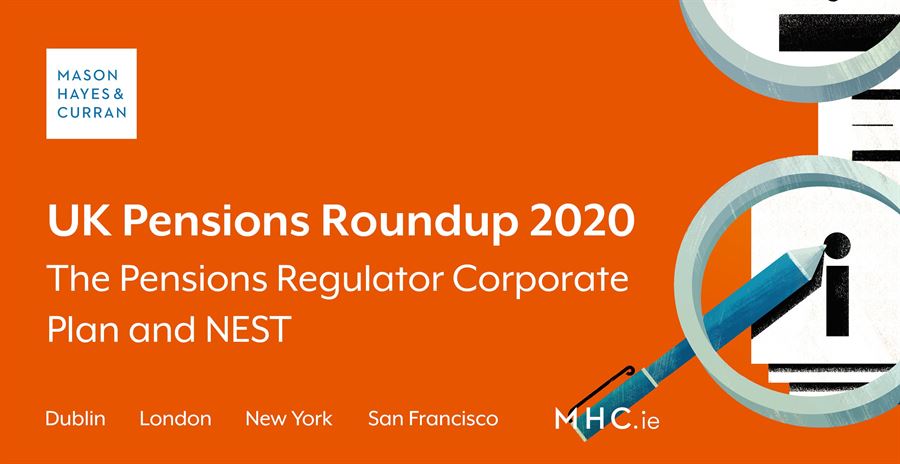
The recently published 2020-21 corporate plan of The UK Pensions Regulator aims to maintain its standards and to support members and schemes, while still adjusting for the fallout of COVID-19.
The Pensions Regulator’s 2020-21 Corporate Plan
The Pensions Regulator (TPR) Corporate Plan (Plan) was released on 29 June and it contains a set of adjusted priorities to allow for the economic impact of the pandemic. The Plan sets out the following priorities for TPR for the next 12 months:
-
Protect the benefits of members of occupational pension schemes
-
Protect the benefits of members of personal pension schemes where direct payment arrangements are in place
-
Promote and improve understanding of the good administration of work-based pension schemes
-
Reduce the risk of situations arising which may lead to compensation being payable from the Pension Protection Fund
-
Maximise employer compliance and employer duties and the employment safeguards introduced by the Pensions Act 2008
-
In relation to DB scheme funding, to minimise any adverse impact on the sustainable growth of an employer
 Regulatory Activity
Regulatory Activity
In the Plan, it is noted that any regulatory activities paused due to the pandemic would restart at appropriate times and Charles Counsell, CEO of TPR, states that “where appropriate [TPR] have taken into account the easements relating to COVID-19 in determining the areas of focus in our subsequent priorities.”
In aiming to protect member benefits, the Plan notes that TPR will continue to warn savers about scams and not rush into rash investment decisions due to COVID-19. This very much echoes the Irish Pensions Authority’s recommendation on making hasty investment choices.
To continue its role in regulatory intervention, TPR will continue to develop “one-to-one relationship supervision” with large schemes and engage with those administrator firms whose actions affect the retirement benefits of millions. On this point Mr. Counsell noted that TPR would use its supervisory powers to “tackle those who flout the law”.
A new culture
In implementing its new culture of a “clear, quick and tough” regulator, TPR aims to be clear about its expectations for trustees and administrators in respect of maintaining high standards of governance and administration. TPR also aims to consolidate its existing codes into a single code of practice for stakeholders by the end of 2020.
While noting that automatic enrolment (AE) is now widely understood, TPR will aim to deliver effective AE regulation going forward. In the year ahead, it will focus on ensuring the integrity of the AE regime and supporting employers that have been impacted by COVID-19.
Obligations
While noting the challenges that COVID-19 has brought, the foreword to the Plan notes that it will not weaken TPR’s commitment to “protecting savers and the PPF by making sure pensions schemes and employers fulfil their obligations and meet [TPR’s] expectations”
NEST and tobacco
The National Employment Savings Trust, or ‘NEST’, is a workplace pension scheme set up to facilitate automatic enrolment as part of the UK government's workplace pension reforms. NEST has recently taken the decision to divest from tobacco stocks.
The decision to divest
NEST has chosen to divest from tobacco industry stocks in something of an example to the UK pensions industry. Mark Fawcett, the CIO of Nest, noted that there was a sense amongst UK trustees that “it was too difficult to divest from tobacco because of fiduciary duty constraints”. However, as a signatory to the United Nations supported Principles for Responsible Investment (PRI), NEST chose to be an advocate for tobacco divestment and shared its research with other interested pension funds.
Tobacco industry practices and performance
Of particular concern to NEST was the alleged uses of child labour in the tobacco industry and of course the environmental impact of tobacco waste products. As well as ESG red flags, NEST’s research showed significant issues for the tobacco industry in ever increasing levels of regulation and litigation. Mr. Fawcett said that “we concluded, along with our investment committee and trustees, that this industry is effectively going to run into the ground and we decided to divest while we had the choice.”
Conclusion
TPR is clearly determined to be far more involved in the industry that it regulates and to ensure that it is not seen by stakeholders as reactionary or passive. The Irish Pensions Authority’s programme of engagement, announced in February of this year, as well as the Irish Pension Regulator’s recent address to the Society of Actuaries in respect of defined benefit schemes, suggests that the Irish regulator is beginning to adopt a similar approach.
With over 10 million workers enrolled in workplace pensions in the UK, the decision by NEST to divest from the tobacco industry must be a significant concern for publicly traded companies that are seen as “sin stocks”. Sustainable portfolios have, in general, outperformed others during the pandemic and this decision by NEST will contribute to growing realisation that ESG investing is here to stay.
For more information, contact a member of our Pensions team.
The content of this article is provided for information purposes only and does not constitute legal or other advice.






